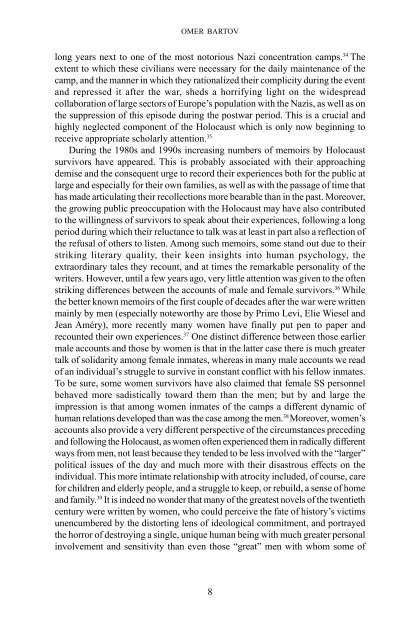The_Holokaust_-_origins,_implementation,_aftermath
The_Holokaust_-_origins,_implementation,_aftermath
The_Holokaust_-_origins,_implementation,_aftermath
Create successful ePaper yourself
Turn your PDF publications into a flip-book with our unique Google optimized e-Paper software.
OMER BARTOV<br />
long years next to one of the most notorious Nazi concentration camps. 34 <strong>The</strong><br />
extent to which these civilians were necessary for the daily maintenance of the<br />
camp, and the manner in which they rationalized their complicity during the event<br />
and repressed it after the war, sheds a horrifying light on the widespread<br />
collaboration of large sectors of Europe’s population with the Nazis, as well as on<br />
the suppression of this episode during the postwar period. This is a crucial and<br />
highly neglected component of the Holocaust which is only now beginning to<br />
receive appropriate scholarly attention. 35<br />
During the 1980s and 1990s increasing numbers of memoirs by Holocaust<br />
survivors have appeared. This is probably associated with their approaching<br />
demise and the consequent urge to record their experiences both for the public at<br />
large and especially for their own families, as well as with the passage of time that<br />
has made articulating their recollections more bearable than in the past. Moreover,<br />
the growing public preoccupation with the Holocaust may have also contributed<br />
to the willingness of survivors to speak about their experiences, following a long<br />
period during which their reluctance to talk was at least in part also a reflection of<br />
the refusal of others to listen. Among such memoirs, some stand out due to their<br />
striking literary quality, their keen insights into human psychology, the<br />
extraordinary tales they recount, and at times the remarkable personality of the<br />
writers. However, until a few years ago, very little attention was given to the often<br />
striking differences between the accounts of male and female survivors. 36 While<br />
the better known memoirs of the first couple of decades after the war were written<br />
mainly by men (especially noteworthy are those by Primo Levi, Elie Wiesel and<br />
Jean Améry), more recently many women have finally put pen to paper and<br />
recounted their own experiences. 37 One distinct difference between those earlier<br />
male accounts and those by women is that in the latter case there is much greater<br />
talk of solidarity among female inmates, whereas in many male accounts we read<br />
of an individual’s struggle to survive in constant conflict with his fellow inmates.<br />
To be sure, some women survivors have also claimed that female SS personnel<br />
behaved more sadistically toward them than the men; but by and large the<br />
impression is that among women inmates of the camps a different dynamic of<br />
human relations developed than was the case among the men. 38 Moreover, women’s<br />
accounts also provide a very different perspective of the circumstances preceding<br />
and following the Holocaust, as women often experienced them in radically different<br />
ways from men, not least because they tended to be less involved with the “larger”<br />
political issues of the day and much more with their disastrous effects on the<br />
individual. This more intimate relationship with atrocity included, of course, care<br />
for children and elderly people, and a struggle to keep, or rebuild, a sense of home<br />
and family. 39 It is indeed no wonder that many of the greatest novels of the twentieth<br />
century were written by women, who could perceive the fate of history’s victims<br />
unencumbered by the distorting lens of ideological commitment, and portrayed<br />
the horror of destroying a single, unique human being with much greater personal<br />
involvement and sensitivity than even those “great” men with whom some of<br />
8



